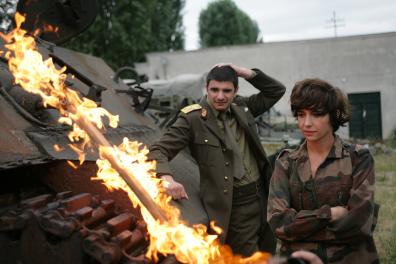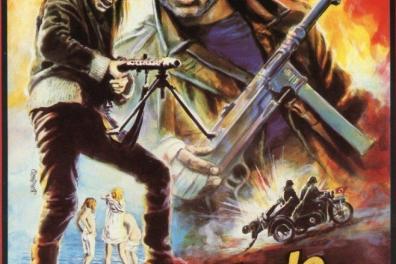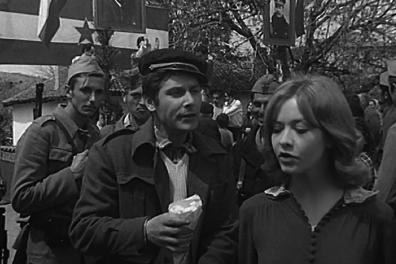Screening-debate series: "Cinematographic (counter-)memories of conflicts in mediterranean Europe" 2022-2023

Find the programming for the 2023-2024 screening-debate cycle.
Design and organization: Anne Madelain (Inalco, centre de recherche Europes-Eurasie-CREE) and Naïma Berkane (Sorbonne Université, Eur'Orbem)
Location: Auditorium
Inalco, PLC - 65, rue des Grands Moulins - 75013 Paris
This cycle is aimed at students and the general public.
Free admission.
In this cycle of screenings followed by discussions, we'll look at the films as documents and actors in the historiographical debates and battles specific to Central, Eastern and Balkan Europe under Communist or authoritarian regimes and after their fall.
The films will be screened in their original version with French subtitles (or, failing that, in English), followed by discussion/debate in the presence of the director, a member of the film team or a specialist in the field. Screenings can take place in a variety of formats (one or more films, feature-length fiction films, animated films, documentaries and experimental shorts, fiction or documentary).
Programme for the cycle of screening debates (October 2022 - May 2023)
- Friday April 14, 2023 - 6:00 pm - 9:00 pm
Peu m'importe si l'histoire nous considère comme des barbares (Îmi este indiferent dacă în istorie vom intra ca barbari)
Radu Jude, 2018, 140 minn, distribution: Météore Films
In the summer of 1941, the Romanian army advanced into Soviet territory alongside the Wehrmacht, first into Bessarabia and Northern Bukovina, then into the territory of Transnistria. In October, Romanian soldiers massacred tens of thousands of Jews in Odessa, on the orders of Marshal Antonescu. How can we evoke this painful, long-obscured page of history in Romania today? Mariana Marin (Ioana Iacob), a young theatre director, has come up with a project for a show in the form of a re-enactment of a military parade. But in a context of fierce competition for memory and rampant Holocaust denial, such a return to the past proves anything but easy, as the project's participants and outside contributors all have strong views on the matter, from extras (Traian, played by Alex Bogdan) to representatives of the local authorities (Movilă, played by Alexandru Dabija).
Released at the Karlovy Vary International Film Festival in 2018 (Crystal Globe for Best Film and CICAE Award), at the Festival Indépendances et créations d'Auch in 2018, at the Festival Travelling de Rennes in 2019 and critically acclaimed.
The screening will be followed by a discussion with Irina Gridan, historian, lecturer at Inalco.

- Monday, February 13, 2023 - 6:00 pm - 8:30 pm
Landscape No. 2 (Pokrajina Št.2)
Vinko Möderndorfer, 2008, 90 min, vostfr, production: Forum Ljubljana
Burglars Sergej and Polde steal a precious painting entitled "Landscape No. 2". By chance, Sergej also steals a mysterious document dating from the end of the Second World War. An instructor is assigned to find the missing painting and document, and the investigation resurfaces the diabolical mechanisms of the past.
Landscape No. 2 was born of the realization that any undigested past - personal or national - leaves traces and comes back to haunt us. Its return weighs heavily on the new generations, who are not directly concerned by the past of their fathers and grandfathers, and who are indifferent to this question. The film recounts the post-war executions of Nazi collaborators whom even the Catholic Church had supported. Similar stories haunt other nations too. However, perhaps they are less traumatic there, as the extrajudicial executions of traitors in Slovenia are linked to the long presence of the Communist regime. The story of the liquidation of collaborators in the post-war period keeps coming back into the European consciousness, and so far we haven't overcome these traumatic events to put them definitively in the archives of history.
Vinko Möderndorfer.
The screening will be followed by a discussion moderated by Jovana Papovic (CETOBaC, EHESS), Kaja Dolar (Inalco), and Nicolas Brunot, student at Inalco.



- Friday, October 28, 2022 - 3:00 pm - 9:30 pm
Yugoslav Partisans: historical figures and cinematic heroes
Three-film screening introduced and commented by Naïma Berkane (Eur'Orbem)
Heroes of the War of National Liberation, the Partisans were celebrated in socialist Yugoslavia and a whole visual culture was attached to them. The inaugural act of post-war Yugoslav cinematography, Slavica, is a film glorifying Communist resistance against the occupiers that gives rise to a specific and prolific genre, ranging from socialist realism to westerns or spy films: "partisan cinema". We propose to observe some of its variations through three films produced between 1964 and 1971, during the second cinematic modernism: Le Traître (previously titled in French "Ballade à Sarajevo") a big-screen international co-production, Serge Gainsbourg and Jane Birkin in the cast and a rare example of a film centered on the activities of the Women's Anti-Fascist Front; L'Embuscade, a naturalist, so-called "Black Wave" film that acts as a counter-narrative to the revolutionary moment; Prometheus of Viševica Island, a modernist auteur film whose complex structure questions memory as an act of recollection and presents great aesthetic radicalism.
3:00 pm: The Traitor (Devetnaest djevojaka i jedan mornar), Milutin Kosovac, 1971, Bosna Film (1h13)
5:00 pm: The Ambush (Zaseda), Živojin Pavlović, 1969, Filmska radna zajednica (1h20)
7:00 pm: Prometheus of Viševica Island (Prometej s otoka Viševice), Vatroslav Mimica, 1964, Jadran film (1:30)

- Monday, October 10, 2022 - 6:00 pm - 8:30 pm
Retour à Višegrad
Julie Biro & Antoine Jaccoud, Switzerland, Louise Productions, 2020, 95 minutes
Twenty-five years after the Bosnian war, two retired teachers hit the road to find the pupils of a school class in Višegrad, the town in the east of the country known for its famous bridge over the Drina. Serbian or Muslim, and above all neighbors and playmates, the children were separated in the spring of 1992 and have never seen each other since. Class photo in hand, the old Yugoslav Zastava out of the garage, Djemila, the teacher's widow, and Budimir, former principal of the elementary school, set out on the roads of a vanished country in the hope of convincing those they find to reunite once more.
Retour à Višegrad is a bitter journey, held between the cast shadow of a painful past for the protagonists and the ambiguous light, the one where the joy of reunion, the promise of a common future and a grieving conscience merge. For Igor, Mirela, Mladen and the others know that their childhood was stolen from them and that they remain the inconsolable heirs of a vanished world. Emmanuel Chicon, festival Visions du réel 2021.
In the presence of director Julie Biro
Further films are scheduled for the program in April and May 2023.
(Information coming soon)